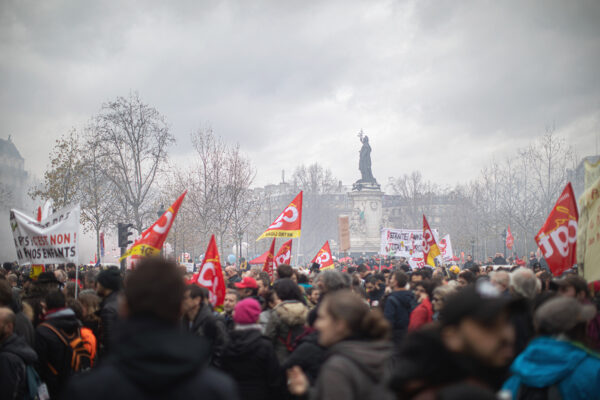
French metro and railway workers have been on strike for almost a month to preserve privileges from an era when the trains ran on coal.
The people who suffer the most are workers on modest incomes who don’t own a car and normally commute into Paris by train; small businesses and shops which are understaffed; families that couldn’t get together for Christmas.
The unions behind the strikes claim they are fighting a “president of the rich” — Emmanuel Macron — on behalf of “the people”.
They aren’t. Trade unions are trying to preserve retirement rules that benefit their workers at the expense of everyone else.
Support
The unions that support the strike represent under 3 percent of French workers. John Lichfield estimates that just .6 percent of French public sector workers are on strike, barely .1 percent of the overall French workforce.
By far most strikers, some 30,000 out of roughly 35,000, are on the railways and Paris Metro.
Noga Arikha reports from Paris that patience in the city is wearing thin:
Strike fatigue is setting in. Business goes on as usual, as much as possible, but tempers are getting shorter on the roads and in the few available trains and buses.
Polls still show sympathy for the strikes, but support is coming down. As is the number of strikers. Outside Paris, most buses and trains are running again.
Objectives
Still the unions persist, claiming Macron has a hidden “neoliberal” agenda to privatize the pension system.
This is a lie. Macron’s objectives are transparent and reasonable:
- To bring the retirement age in the public sector in line with the private sector. Railway drivers can now retire at 50, policemen at 52 and metro workers at 55. The national retirement age is 62.
- To merge the 42 existing public pension funds — ten different ones in the railways alone — into a single, points-based system, which would make it easier to switch jobs and no longer punish women for interrupting their careers to raise children. (Men on average retire at 60. Women on average have to work until 67 to receive the same pension.)
Pensions will remain in state hands. Changes will not apply to anyone in retirement. There will be a twenty-year transition to the new system. Rail and metro workers aged 34 and above will retain all their privileges. Almost nobody who is on strike today will actually experience any change.
Clearly this is not about pensions. It’s about trade unions who don’t like the sitting president.
Macron previously went over the unions’ heads to liberalize labor law. He made it easier for employers to fire and hire workers and allowed them to bypass union-dominated workers’ councils to call company-wide referendums on topics like overtime.
Macron also allowed buses to compete with trains, lowering fares for passengers but undermining the monopoly of the state railway company. He ended automatic pay rises for train workers.
All of this has helped the ordinary French. Business creation is up 60 percent since Macron became president. Unemployment is at its lowest in a decade.
But it has hurt the unions, who would rather non-union workers continue to subsidize privileges they have enjoyed for decades.
